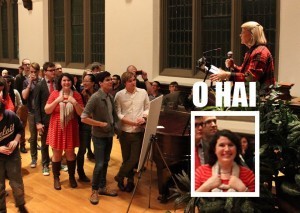Chris Stedman's Blog, page 24
November 14, 2012
A Lengthy Response to Zach Alexander
Just a quick note: this post shouldn’t be taken as representative of Chris or his views. He’s been keeping abreast of his critics and has been thinking carefully about the points they raise. But he is also quite busy with obligations surrounding the release of his book and his work organizing this weekend’s upcoming Humanist Community at Harvard Values In Action event, which is working to pack 40,000 meals for food-insecure children. In the meantime, why not check out the project and consider donating here.
Zachary Alexander wrote a review of Chris’s book, Faitheist, and it has gotten a fair amount of attention in the online atheist community. There are a lot of nice things to say about the post, and in fact I find much of it to be a compelling personal narrative that, for the most part, is completely in line with and in support of Chris’s message and project. I’d recommend reading Dan Fincke at Camels and Hammers for a brief treatment of some relevant portions, as well as an interesting comment discussion.
As a review and as a fair, thoughtful treatment of Chris’s book, however, I think the review fails thoroughly (though, bizarrely, his Amazon review I think fares much better). And I honestly find this to be a shame, because the rest of the review—a good 80% of it—is so touching and engaging. However, I think almost all of the criticisms, both big and small, fail. They suffer from uncharitable reading, and they serve only to reinforce current misconceptions about Chris and his work. So I’d like to take this chance to recommend a read of Zach’s piece with some caveats—read it for the story but realize much of his arguments against Chris are misguided or false. Because Zach’s review is rather large, and there’s a lot I want to address, I’ll apologize in advance for the length of this post. But I think these points are important and worth addressing.
Hypocrisy and the limits of pluralism
The first criticism of Chris’s work is a shallow one, and I’ve read it often enough that it warrants a response. Zach, and a few others, have suggested that Chris throws atheists under the bus, builds bridges with everyone but atheists, wants pluralism except with atheists, and so on. The basic idea is that Chris is a hypocrite. Zach writes, “The most obvious problem is that even as Chris extolls the virtues of religious pluralism, he delivers an anti-pluralist message to his fellow atheists.”
But I’ve never been quite sure where Chris goes out and does this. Near the start of the book, he praises and agrees with the religious critiques of the new atheists (pg. 13). Chris never suggests that atheists ought to be silent or refrain from religious criticism. He never tells atheists that they can’t be a part of his pluralist project. In fact, the atheists he criticizes, myself once included, are reached out to with the same hand Chris gives to the religious. I’ve only ever seen him respond with patience and kindness.
Though Chris does offer critiques of the atheist community a few times throughout Faitheist, they are of specific practices and strategies that he sees as counterproductive, and not indicative of atheists as a whole. The only thing I can think of, then, is a passage from Chris’s controversial Salon excerpt, where he says “I believe that this so-called New Atheism—the kind that singles out the religious lives of others as its No. 1 target — is toxic, misdirected, and wasteful”
The message seems rather clear to me, and frankly not that controversial. Chris is promoting pluralism. Atheists who have as their main focus the destruction of religion are anti-pluralist. It would be bizarre to insist that pluralists work with anti-pluralists in the name of pluralism, just as it would be absurd to ask us to tolerate intolerance in the name of tolerance. These projects necessarily can’t be self-defeating, and it’s a strange critique to complain that they aren’t.
I’ve seen a lot of atheists critique this project as hostile to many atheists, and they say it is tantamount to stabbing atheists in the back. PZ Myers recently made a point like this in response to Zach’s piece (in what is actually one of the better treatments of Chris’s positions I’ve seen from PZ). But I’m still not quite sure what the problem is supposed to be. Chris has something he wants to promote, sees certain practices to be harmful, and he says as much rather respectfully.
Isn’t that exactly what antitheists do, and would have Chris do, to the religious? Isn’t it, at this point, something of atheist canon to say that honest criticism is how we show respect to those we disagree with? And isn’t a hallmark of a strong community that it can withstand internal criticism?
It’s absurd to suggest that Chris has somehow crossed a line by criticizing atheists he thinks are wrong, while showing not even a fraction of the vitriol I’ve seen poured on to the religious (or on to Chris) by some bloggers. And this strikes me as a clear double standard: should we expect Chris to play nice with antitheists, instead of criticizing them, so as not to hurt their feelings? Isn’t that exactly the attitude towards the religious (falsely) attributed to Chris and criticized so eagerly by those same bloggers?
If Chris’s arguments are wrong and pluralism is a bad thing, or his arguments against antitheism fail, then that should be the critique of his work. But the critique that Chris is at fault for criticizing atheists or not including anti-pluralists in a pluralist project is one that I have a difficult time taking seriously. And I think, ultimately, if atheists insist on dealing in criticism, they should accept it in return without crying foul.
Post-nothing, or down with secular Shibboleths.
The second criticism I find nearly as frustrating. Zach suggests that Chris doesn’t share the same epistemic values as most atheists. Chris is somehow “post-truth,” only concerned with the feelings of religious believers and not with how right they are. It is strange that Zach acts as if this idea—that Chris and other mainstream atheists diverge on certain core values—is some kind of revelation. I’m pretty sure Ophelia Benson has been saying as much for years, and the difference in values came to the forefront last December when Chris responded to Greta’s blog post detailing the values of the atheist movement—an exchange Zach references, bizarrely enough.
What’s novel, though, is that Zach isn’t claiming Chris doesn’t properly prioritize epistemic values; rather, he suggests that Chris only superficially shares them, if at all. Zach writes:
“[Chris] values compassion and social justice to a remarkable, exemplary degree, yet places almost no value on the epistemological virtues near and dear to most in the atheist movement, such as rationality, skepticism, and the scientific method.”
Zach goes so far as to compare Chris to a restaurant critic who writes exclusively about ambiance and service, leaving out any mention of how the food tasted—suggesting that the only thing atheists do and ought to care about is whether or not religious claims are true. Zach writes:
It explains why he is so hypocritical about pluralism and respect – he simply does not see much value in the epistemic goals of the “New Atheists,” seeing only the hurt feelings they cause, and the interfaith work they could be doing instead. Granted, if Richard Dawkins and Sam Harris were going around offending people for no higher purpose, Chris would be right to call their work “toxic, misdirected, and wasteful.” But they aren’t. And he isn’t.
But this strikes me as an extremely bizarre critique, considering right at the start of the book (pg. 13), Chris writes:
Although I believe that many New Atheist critiques of religion are correct and have helped many people find liberation from oppressive beliefs, some of these critiques have also often neglected to account for the full range of religious expression and have resulted in segregation that has parsed the religious and the secular into opposing camps.”
Chris not only expresses agreement and support with these atheists epistemically, but makes clear that he has problems with their reductive view of religion and tendency toward encouraging tribalism. Chris throughout the book makes no effort to hide that he agrees with atheist criticisms of religion or thinks that many religious claims are wrong. Whether he makes that the forefront of his engagement with the religious is another issue—Zach complains that Chris focuses too much on eliminating suffering but not ignorance, and to that I ask, if eliminating ignorance doesn’t make the world a better place then what’s the point?—but to claim that Chris is somehow post-truth because of this is absurd. Zach writes:
Perhaps I missed a blog post where Chris explains how he does, in fact, care about all these things. But until I see him wax poetic about the scientific method, or exhibit some passion for the theory of evolution, or at least confess his abiding love for Star Trek: The Next Generation – color me skeptical.
Reading this and the section preceding it, it’s difficult for me not to get the impression that the real issue here is that Chris just didn’t use the word “reason” enough in his book. The problem is that Chris is seen as not acting or talking like other atheists—he hasn’t publicly expressed his appreciation for Star Trek (neither have I), he doesn’t talk at length about reason and rationality (neither do I), and he doesn’t unnecessarily praise Darwin or measure anything in KiloSagans (and neither do I). But that has absolutely nothing to do with one’s feelings about epistemology (and I have some pretty strong feelings about epistemology).
So this critique strikes me as so strange. Chris isn’t in lock-step with freethinkers’ jargon and that’s a problem? Can’t there be value in communicating our ideas in various ways, or appealing to different values for different audiences? I won’t speak for Chris, but the reason I don’t talk about Logic and Reason and skepticism or freethought is because they strike me as such obvious and vacuous Shibboleths, signaling little more than group inclusion.
It’s not often that you see an atheist who has taken a formal logic class, studied Bayesian statistics, learned basic philosophy of science and research methods, or made an effort to minimize cognitive biases. Not to say it doesn’t happen, but it’s rare enough that appeals to logic, reason, and the scientific method more often than not strike me as hollow. More so, a Catholic like Leah Libresco has put in far more effort than any given atheist, I’d wager, at living out and applying those epistemic values Zach is so fond of—certainly more than I have. Which brings me to my next point: that having these as the values of atheism sends either an implicit (or in many cases a very vocal) message that believers don’t share them. Something which I hope readers will realize is obviously false.
I can’t speak to why Chris doesn’t use that language, but I hope through sharing my own case that it’s clear that, even if you think I’m wrong about my reasons, a failure to pay lip-service to the atheist establishment doesn’t suggest a neglect for epistemic values. Nor does valuing compassion primarily, either in everyday life or philosophically, suggest that someone doesn’t care about what’s true. I’ve seen nothing written by Chris anywhere to suggest that he is, as Zach suggests, a “post-truth atheist.”
Miscellany
I’ve covered the two main points I wanted to address, but the rest of the review struck me as having a lot of smaller errors, as well as some unnecessary cruelty. As such, this might delve into the petty and the minute, but I think it’s important to not let these little jabs go uncorrected. A lot of people are reading Zach’s blog post, seemingly in place of Chris’s book—and many, like Chris Halquist and his commenters, are walking away with the wrong impression.
On the cruelty front: in a review that James Croft praised for being “sensitive and thorough,” Zach writes that “I recommend [Chris] first master the skill of stringing words together into meaningful sentences,” based on the following quote from the book:
“Until those of us who do not believe in God are seen as having an equal capacity to be moral, anti-atheist remarks will continue to perpetuate discrimination and atheists will be seen as less moral than the religious.” (pg. 152)
Zach said that “at times I felt like I was a TA again, grading a third-rate undergraduate philosophy essay,” but I hope he had enough comprehension at the time to realize that the passage taken in context, rather than being tautologous, suggests that, until we build relationships with religious believers who will then be our allies, anti-atheist prejudices will go uncorrected. And unless Zach is advocating we convince people of our morality by yelling at believers, Chris’s point strikes me as a completely normal and comprehensible one to make.
On the topic of reading comprehension, Zach criticizes Chris for being “so deeply offensive as to compare antireligious atheists to fundamentalists (pgs. 149-150)” but Chris didn’t do that. On those pages he quoted two authors expressing broader points, including the comparison, but Chris rebukes that aspect right after, saying “Neither of these writers gets it exactly right. After spending several years deeply embedded in the atheist movement, I know there is no consensus on atheism, nor do I think that the intolerance that proliferates in the atheist movement is equivalent to religious extremism.”
Zach also misreads or misrepresents Chris to paint him as expressing “incipient narcissism.” Zach criticizes Chris for calling himself humble, but Chris didn’t—the passage in question (pg. 162) says Chris’s confidence was humbled. Zach also chastises Chris for having the hubris to compare himself to Moses, a claim that’s false or at best misleading—Chris said (pg. 131) that he identified with Moses’s feeling of apprehension and insignificance at taking on a task, acknowledging that his own task was “not so immense, of course.”
Lastly, in what Zach describes as the “single most baffling, dumbfounding fact of the book,” he expresses incredulity that:
a professional atheist could, with a straight face, ask nonreligious, faithless people to engage themselves in “religious pluralism” and “interfaith work” – a hard enough sell as it is – without making the slightest attempt to find more atheist-inclusive terms for these activities . There are no words.
Actually there are a lot of words. Words that perhaps Zach skipped over when reading, because Chris addressed this point at length. So let me just quote part of the relevant passage (pgs. 174-175).
After saying that he “fully acknowledge that the language of ‘interfaith’ is imperfect, clunky, and can feel exclusive to many nonreligious people” Chris writes:
I believe that change will come from within—that by participating in interfaith work, the nonreligious will broaden the meaning of such efforts and that the language used to describe them will change accordingly. This has certainly been true of my experiences in the interfaith movement. . . When I first began to work with [an interfaith group], they went by the name Social Action Ministries. Soon, however, we began a discussion about their name. Before long, they decided to change it to Social Action Massachusetts”
So rather than being indifferent, as Zach implies, Chris is saying something along the lines of “I realize the language is problematic, but right now the action is more important. Worry about the name later, because the language has historically become more inclusive, it will become more inclusive in the future, and it will be easier to accomplish this change if we get involved.”
In sum, I think there is a lot to value in Zach’s review, but not a lot pertaining to Chris. I think a lot of Chris’s positions have been misrepresented and treated unfairly—not just by Zach but a lot of other bloggers, too. Zach’s review reinforces lazy and shallow stereotypes of Chris and his work, and I hope I have gone some way towards correcting them.
 Vlad Chituc is a lab manager and research assistant in a social neuroscience lab at Duke University. As an undergraduate at Yale, he was the president of the campus branch of the Secular Student Alliance, where he tried to be smarter about religion and drink PBR, only occasionally at the same time. He cares about morality and thinks philosophy is important. He is also someone that you can follow on twitter.
Vlad Chituc is a lab manager and research assistant in a social neuroscience lab at Duke University. As an undergraduate at Yale, he was the president of the campus branch of the Secular Student Alliance, where he tried to be smarter about religion and drink PBR, only occasionally at the same time. He cares about morality and thinks philosophy is important. He is also someone that you can follow on twitter.
Count Your Blessings – And Share Them
This post was originally published on the Humanist Community Project blog.
 Okay dudes. The election was exciting, but let’s remember we’ve got to do a lot more than vote to be the change we want to see. We’re in the middle of a huge fundraising push for the biggest service project I’ve EVER worked on. The Humanist Community at Harvard, the Harvard Chaplains, and the Boston Interfaith Campus Coalition are pulling out all the stops to pull together $10,000 and hundreds of volunteers to package 40,000 meals for hungry children in Massachusetts. So, as usual, I’ve got some jobs for all of you friendly folks!
Okay dudes. The election was exciting, but let’s remember we’ve got to do a lot more than vote to be the change we want to see. We’re in the middle of a huge fundraising push for the biggest service project I’ve EVER worked on. The Humanist Community at Harvard, the Harvard Chaplains, and the Boston Interfaith Campus Coalition are pulling out all the stops to pull together $10,000 and hundreds of volunteers to package 40,000 meals for hungry children in Massachusetts. So, as usual, I’ve got some jobs for all of you friendly folks!
1) Donate your $$$. If you’ll be enjoying a hot meal on Thanksgiving in a couple of weeks, then you can afford to help others do the same. Just a $10 donation feeds 40 children! Even better, a $100 donation feeds 400 children! And on and on! Gifts of all sizes are important and appreciated. Please think about your own blessings and be generous.
2) Donate your time. If you’ll be in the Boston area on November 18 – which I KNOW a bunch of Harvardians and Yalies will be! – stop by for as long as you like! We’ll be working from 12-6, and whether you can come for 10 minutes or 4 hours, your help is needed. What better way to recover from the Game than hanging out with friends and helping your neighbors?
Thank you for all that you do and all that I know you will do to help make this dream a reality!
P.S. If you come help out on Sunday, you might get to meet my Learning Lab students! We talked about food systems at our last class, and did some thinking about where our food comes from, what’s in it, who makes it, where food goes and doesn’t go, who doesn’t have access to good food and why, and what we can do to create a more just and healthy food system. The next step is for my students to put their values into action and take a concrete step toward improving our food system by participating in our service project this weekend. The Learning Lab is still enrolling for Winter/Spring 2013, so email clink@harvardhumanist.org for more information or to sign up!
 Chelsea Link recently graduated from Harvard University, where she studied History & Science with a focus in the history of medicine. She is the founder and intermittent author of Blogging Biblically, and has contributed to blogs such as the Interfaith Youth Core and Social Action Massachusetts. She has also left a trail of abandoned blog detritus in her wake, ranging from Sewage & Syphilis to The Unelectables. While at school, she served as both the Vice President of Outreach of the Harvard Secular Society and the President of the Harvard College Interfaith Council. Now that she’s graduated, she is a full-time Adult Impersonator, complete with an apartment (in the People’s Republic of Cambridge, Massachusetts) and a job (as the Campus Organizing Fellow at the Humanist Community at Harvard). She tends to kill the mood at parties by unnecessarily reciting Shakespeare.
Chelsea Link recently graduated from Harvard University, where she studied History & Science with a focus in the history of medicine. She is the founder and intermittent author of Blogging Biblically, and has contributed to blogs such as the Interfaith Youth Core and Social Action Massachusetts. She has also left a trail of abandoned blog detritus in her wake, ranging from Sewage & Syphilis to The Unelectables. While at school, she served as both the Vice President of Outreach of the Harvard Secular Society and the President of the Harvard College Interfaith Council. Now that she’s graduated, she is a full-time Adult Impersonator, complete with an apartment (in the People’s Republic of Cambridge, Massachusetts) and a job (as the Campus Organizing Fellow at the Humanist Community at Harvard). She tends to kill the mood at parties by unnecessarily reciting Shakespeare.
November 11, 2012
What Chris has meant to us: Lyz’s Story
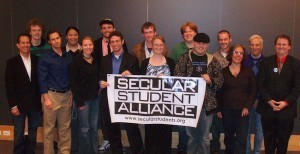 I first met Chris Stedman in early 2010 at the SSA’s New England Leadership Summit. Chris was at that time an intern with the Interfaith Youth Core, an organization that we (at the SSA) were still figuring out how to interact with – and to be honest, we weren’t sure we wanted to. But one thing that stood out to me even then was Chris’s passion for and dedication to the interfaith cause – he took the time that rainy weekend to talk to me about what IFYC did and why, and how he felt that nontheists could fit into that framework.
I first met Chris Stedman in early 2010 at the SSA’s New England Leadership Summit. Chris was at that time an intern with the Interfaith Youth Core, an organization that we (at the SSA) were still figuring out how to interact with – and to be honest, we weren’t sure we wanted to. But one thing that stood out to me even then was Chris’s passion for and dedication to the interfaith cause – he took the time that rainy weekend to talk to me about what IFYC did and why, and how he felt that nontheists could fit into that framework.
Only a few months later, we found ourselves on different sides of one of the most emotionally charged issues I’ve been involved in at work. It was May 2010, and a handful of SSA affiliate groups were planning to participate in “Everybody Draw Mohammed Day” by chalking stick figures labeled “Mohammed” on their campuses. The Muslim and Interfaith communities were up in arms, and I honestly wouldn’t have been surprised if Chris and the Interfaith Youth Core had decided to write us off entirely.
But they didn’t, and that’s when I learned about the trait which I admire the most in Chris – his willingness to move on, to forget, to live and let live. I work with a wide spread of secular students, and among them I see that Chris’s work is met with a variety of opinions. I’ve seen the students who fiercely admire and promote the work Chris does, and I’ve seen the students who will criticize him for how he says “good morning.” I’ve often thought that if I were in those shoes, I would long ago have thrown in the towel and hidden behind an espresso machine for the rest of my life.
But Chris hasn’t done that. And I have been continually amazed at his ability to not only endure and keep on in the face of rather harsh resistance, but his ability to forgive it. To separate the actions of individuals from organizations. To pick up the phone and try and find a solution or some common ground. To move on and look forward, and to do so with a smile. Chris rolls with the punches from those who disagree with him, and at the same time stands as an incredible inspiration to countless others.
That inspires me. When I face those who don’t agree with what I’m doing (and there are a lot – I’m a professional atheist “corrupting America’s youth,” for crying out loud), I remind myself of how Chris moves past those who don’t agree with him. How he works to find common ground. How he doesn’t let detractors slow him down or discourage him. And having seen Chris put it into action, I’m able to bring out a little bit of it in myself.
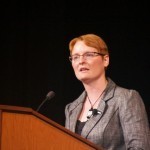 Lyz Liddell is the Director of Campus Organizing at the Secular Student Alliance, or as she likes to jest, “a professional cat herder.” Lyz is the more or less official liason between the Secular Student Alliance and the Interfaith Youth Core, and serves on the Foundation Beyond Belief’s Challenge the Gap advisory committee. In her secret alternate life, Lyz is a professional musician, editor, cyclist, cook and tabletop RPG geek.
Lyz Liddell is the Director of Campus Organizing at the Secular Student Alliance, or as she likes to jest, “a professional cat herder.” Lyz is the more or less official liason between the Secular Student Alliance and the Interfaith Youth Core, and serves on the Foundation Beyond Belief’s Challenge the Gap advisory committee. In her secret alternate life, Lyz is a professional musician, editor, cyclist, cook and tabletop RPG geek.
November 10, 2012
What Chris has meant to us: Walker’s Story
To celebrate the release of Chris’s book Faitheist: How an Atheist Found Common Ground with the Religious, we at Non-Prophet Status have taken it upon ourselves to share how Chris has impacted our lives. Read Vlad’s entry here, Stephen’s here, and Chelsea’s here. We hope that all NPS readers, regardless of their religious belief, will consider submitting their story for us to post at npstatus@gmail.com! Congratulations Chris!
So this one time Chris and I were laughing because we were appreciating how hilariously badass and brilliant both our moms were to us. Who cares what the stigmas are, who cares who they are to other people, they are awesome to us, and we’ve always felt that. Maybe Chris was always able to say so, but I don’t know that I felt totally comfortable expressing that feeling—citing how inspiring someone is in their enthusiastic compassion—before seeing how effortlessly Chris could do it. To honestly identify how others have shaped him, while still taking pride his individuality and self-determination.
Coffee shops and Tex-Mex restaurants, and I meet with Chris and we never end up talking about what we intended to, because we both love music and stories and life too much to do business. Every time, finding a new connection. Nothing relieves loneliness like that. Prolific and multilayered, honest and self-reflective about his shortcomings yet still confident in his accomplishments. It’s a balance that you never master—but every time I’m alone with Chris I’m inspired to continue to strive in that direction.
Chris has propelled me to the work I now dedicate myself to—just two days ago I spoke with him about an idea that casually crossed my mind, and in our discussion it evolved into a titanic initiative that I’m motivated to pursue beyond any single blog post or conversation. He’s given me the forum and the opportunity to build my vision for the world and help others in the way I feel I best can, and has never shot down any thought I’ve shared with him or said “no” to a proposal. He helps me mold my work and my life path, and always offers to take as much time as I need to counsel me and guide me when I ask.
We are all of us brothers. But it’s hard to come up with a better way to uniquely describe what Chris means to me: someone who comes to mind to give me strength whenever I get the creeping feeling that everything is fucking terrible and crumbling and everyone hates me. He’s taken more hits than I could ever imagine, and he’s still standing, proud and honest. When I was back in my hometown and someone shouted “fag” at me out the window of their car, I knew who to turn to to help me reflect and cope. It’s weird: I know he will always be on my side, and will always give me a new window to look through when I need one.
Maturity comes through strengthening your relationships with those around you, and learning to navigate those relationships, driven by compassion and appreciation of difference. I’m sitting here trying to think of someone who taught me this lesson more explicitly, and yet subtly, than Chris. The last two years I’ve known him have marked exponential increase in my admiration of empathy, and I think that’s no accident. When I first met Chris I saw this guy in thick-rimmed glasses who wrote for HuffPo who I accidentally dropped an f-bomb in front of because he was just too damn friendly and easy to be around. Every moment we’ve shared since then reinforces something else that I noticed in that initial impression: he’s an exemplar of sincerity. Wedding honesty, empathy, and passion. It’s not just that I feel comfortable at his side now—I feel like there’s nowhere else I belong.
My perspective is ever-evolving, as is his. Chris’s mentorship catalyzes that evolution, and seeds and grows in me precisely what anyone I’ve met since knowing him tells me they like about me. He’s not the only one who inspires me—but his inspiration permeates every ever-maturing aspect of myself in a way unmatched by my other heroes. A champion of my own vision, and a friend. Even in the darkest hour for either of us. Thanks; I usually only find idols like you in a book.
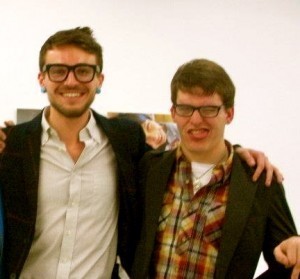 Walker Bristol woke up this morning and realized, to his dismay, that he is the President of the
Tufts Freethought Society
and the Director of Communications for
Foundation Beyond Belief
. This is especially peculiar considering he grew up as a high school wrestler-pianist in North Carolina and intended to become Luke Skywalker for an undisclosed period of his life, eventually settling for a Star Wars tattoo. The Tufts Political Science and Religion departments suffer his enrollment. He writes about social activism and art in the
Tufts Daily
, and about religion in the 2012 election for
The Unelectables
. His diet consists of hummus. He tweets nonsense on all these fronts
@GodlessWalker
.
Walker Bristol woke up this morning and realized, to his dismay, that he is the President of the
Tufts Freethought Society
and the Director of Communications for
Foundation Beyond Belief
. This is especially peculiar considering he grew up as a high school wrestler-pianist in North Carolina and intended to become Luke Skywalker for an undisclosed period of his life, eventually settling for a Star Wars tattoo. The Tufts Political Science and Religion departments suffer his enrollment. He writes about social activism and art in the
Tufts Daily
, and about religion in the 2012 election for
The Unelectables
. His diet consists of hummus. He tweets nonsense on all these fronts
@GodlessWalker
.
November 9, 2012
What Chris has meant to us: Chelsea’s story
To celebrate the release of Chris’s book Faitheist: How an Atheist Found Common Ground with the Religious, we at Non-Prophet Status have taken it upon ourselves to share how Chris has impacted our lives. Read Vlad’s entry here and Stephen’s here. We hope that all NPS readers, regardless of their religious belief, will consider submitting their story for us to post at npstatus@gmail.com! Congratulations Chris!
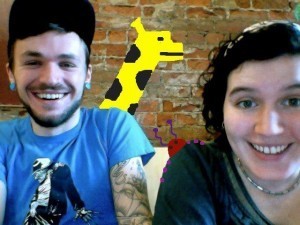 From the day I met Chris, he has been helping me feel proud of who I am.
From the day I met Chris, he has been helping me feel proud of who I am.
I was at an Interfaith Leadership Institute organized by the Interfaith Youth Core, and I felt incredibly out of place. I had never been involved with the IFYC or anything interfaith before, and had signed up for the program last minute on the recommendation of Greg Epstein, my school’s Humanist chaplain, whom I had only recently met. I’d been a lonely and struggling atheist for almost two years, had only just gotten involved in a secular student group a few weeks earlier, and was still coming to terms with that identity.
All around me people kept excitedly telling new acquaintances about their beliefs, their rituals and traditions, their favorite obscure holidays, their convoluted dietary restrictions, their prophets and sacred texts and inspirational parables. We had all been organized into teams named after different “Faith Heroes”: a Catholic, a Hindu, a Baptist, and a Jew. I felt like my admission to this program had been a clerical error at worst, a token diversity attempt at best. I was terrified of having to meet all these people and be asked the question of the day—“What’s your faith tradition?”—and have to admit, over and over, that I didn’t have one. I spent the whole afternoon red-faced, mumbling “ohimkindofyouknowjustanmmrrrphatheistmmmrrrphsorrybye” when pressed for comment.
To my surprise, my confession of godlessness was always greeted warmly and charitably. People seemed genuinely excited that I was there. That was heart-warming, and it really did make me feel welcome—but I still felt alone. It wasn’t until I happened to run into one of the IFYC’s non-religious staffers that that changed.
“I’m so glad you came—and don’t worry, we’re not the only ones! Did you know Chris Stedman is here too?”
The name-dropping bell in my head, which had almost worn out after two years at Harvard, buzzed excitedly. I had not really begun my foray into the world of organized atheism yet, but I knew the names of the Horsemen and a few other stars, and I had gathered that blogs were a big deal. The Friendly Atheist and NonProphet Status were regularly mentioned at secular student meetings, and although I had trouble getting my shit together enough to read anything that wasn’t assigned for a class, I knew that Hemant Mehta and Chris Stedman were Important People in the godless world.
This was a famous person who was actually relevant to my life, and he was here! What’s more, as I learned seconds later, he actually wanted to meet me—me! And interview me! For his blog!!
My incredible and embarrassingly recent naïveté aside, the fact is that Chris was kind of a hero to me. When I met him, he turned from internet hero to real-life role model, helping make that weekend a positive and life-changing experience instead of a scary and awkward one. A few months later, he made a point of meeting with me on a trip toBoston, and soon came to work at the Humanist Chaplaincy at Harvard. He became a crucial mentor, showing me how to navigate the strange terrain where atheism and interfaith overlap. Most importantly, over the last few years, he has become one of my dearest friends.
From hauling around huge sacks of textured vegetable protein and herding hundreds of volunteers for interfaith hunger relief service projects, to ordering in pad thai and watching the X Factor, to congratulating and consoling each other for the many ups and downs in our personal and professional lives, Chris and I have been through a lot together. But most importantly of all, Chris serves as a constant reminder to me to live the values I profess. When I am exhausted and disillusioned and want to give up on everything, his commitment and integrity reassures me that goodness is possible. I can honestly say that, more than anybody else I know, Chris is being the change he wishes to see in the world.
Chris Stedman is my hero, my role model, my mentor, and my friend. I am so incredibly proud of him and his book that I might explode into a cloud of confetti at any moment. Buying Faitheist will be the best decision you make this week. Get it, read it, and let me know if Chris changes your life, too.
 Chelsea Link recently graduated from Harvard University, where she studied History & Science with a focus in the history of medicine. She is the founder and intermittent author of Blogging Biblically (documenting her attempt to read the Bible in a year…ish), and has contributed to blogs such as the Interfaith Youth Core and Social Action Massachusetts. She has also left a trail of abandoned blog detritus in her wake, ranging from Sewage & Syphilis to The Unelectables. While at school, she served as both the Vice President of Outreach of the Harvard Secular Society and the President of the Harvard College Interfaith Council. Now that she’s graduated, she is a full-time Adult Impersonator, complete with an apartment (in the People’s Republic of Cambridge, Massachusetts), a full-time job (as the Campus Organizing Fellow at the Humanist Chaplaincy at Harvard), a part-time job (as a Teaching Assistant for a Harvard course on Darwin), and an automobile (a sassy red one named Sofia Vercara). In her spare time, Chelsea runs bone marrow drives as a Volunteer Ambassador for the National Marrow Donor Program. She also enjoys cooking while pretending she’s on Top Chef, adores word games of all kinds (and was once the President of the illustrious Harvard College Crossword Society), and tends to kill the mood at parties by unnecessarily reciting Shakespeare.
Chelsea Link recently graduated from Harvard University, where she studied History & Science with a focus in the history of medicine. She is the founder and intermittent author of Blogging Biblically (documenting her attempt to read the Bible in a year…ish), and has contributed to blogs such as the Interfaith Youth Core and Social Action Massachusetts. She has also left a trail of abandoned blog detritus in her wake, ranging from Sewage & Syphilis to The Unelectables. While at school, she served as both the Vice President of Outreach of the Harvard Secular Society and the President of the Harvard College Interfaith Council. Now that she’s graduated, she is a full-time Adult Impersonator, complete with an apartment (in the People’s Republic of Cambridge, Massachusetts), a full-time job (as the Campus Organizing Fellow at the Humanist Chaplaincy at Harvard), a part-time job (as a Teaching Assistant for a Harvard course on Darwin), and an automobile (a sassy red one named Sofia Vercara). In her spare time, Chelsea runs bone marrow drives as a Volunteer Ambassador for the National Marrow Donor Program. She also enjoys cooking while pretending she’s on Top Chef, adores word games of all kinds (and was once the President of the illustrious Harvard College Crossword Society), and tends to kill the mood at parties by unnecessarily reciting Shakespeare.
November 8, 2012
Excerpts From ‘Faitheist’
Originally posted on FaitheistBook.com.
There are now several excerpts from Faitheist available online. Yesterday, the Friendly Atheist posted an exclusive excerpt, which can be read here.
Additionally, Beacon Press has shared chapter 1 in its entirety, which can be read here. An excerpt from this chapter was previously published on Salon, where it was the most read piece that weekend and garnered over 4,000 Facebook shares within 24 hours.
To read Faitheist in its entirety, visit your local bookstore or order it from Amazon, Barnes & Noble, or IndieBound.
November 7, 2012
What Chris has meant to us: Stephen’s story
To celebrate the release of Chris’s book Faitheist: How an Atheist Found Common Ground with the Religious, we at Non-Prophet Status have taken it upon ourselves to share how Chris has impacted our lives. Read yesterday’s entry by Vlad, here, and we hope that all NPS readers, regardless of their religious belief, will consider submitting their story for us to post at npstatus@gmail.com! Congratulations Chris!
My first interaction with Chris Stedman came about late in my life as an atheist. Back in Spring 2010, I heard through the secular grape-vine about some essay contest hosted by some blog. I had seen these contests before: some national or international atheist organization pays some Young Atheist some amount of money to reproduce some logical disproof of god(s) or some account of how Young Atheist stood up for atheism in the face of some daunting religious majority. I bookmarked the page and moved on to more important matters, specifically this Star Wars video game.
Later, when I needed to do some Spring cleaning on my Firefox files, I ran across the post, resigned to at least give it a quick once-over before deleting it. This was… different. The Share Your Secular Story contest was not about fitting the atheistic mold or churning out logic robots. Rather, SYSS sought to empower all atheists, regardless of their experiences, to tell the world what they believe and why. SYSS was an equalizer: its basic philosophy was that all stories are valuable, and together we can weave a cohesive narrative reflecting how atheists think and feel.
This was the first time it ever occurred to me that my story mattered. I’m no Sagan or Feynman or Hitchens, or any of the select few atheists whose lives we actually cared about enough to read. Who’d want to read about me? Apparently, Chris Stedman did. I put off studying for my finals and rushed to set my story in my computer screen, submitting it within a few hours of the deadline. It was a day of self-reflection unlike any I’d previously had. I thought and wrote about what it was like to grow up as a conservative evangelical Christian and how these beliefs were shattered when I was diagnosed with cancer in high school. How I was rejected by my evangelical clique and rejected them and their institution in turn. How I met Richard Dawkins through the Make-A-Wish foundation, went to Tufts to study under Daniel Dennett, and took office in the Tufts Freethought Society my freshman year. How finding a huge community that accepted me without pretense motivated me to concentrate less on ridiculing religious friends and focus on building up the affirming community I now called home. This level of self-exploration was painful and forced me to revisit some things I didn’t want to think about. But there was something oddly satisfying about this uncomfortable self-discovery, a feeling not unlike the fulfillment which followed the sharp pain of my first tattoo.
I was thrilled when I got the email stating I’d won first runner-up. I requested that my story not be put on this blog because I didn’t think it was ready for public scrutiny. The validation I felt, that my story was not only valuable but contest-winnable, was enough.
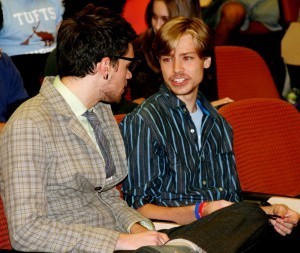
Meeting Chris IN REAL LIFE
That Fall, I received word from Greg Epstein, the Harvard Humanist Chaplain, that a Humanist VIP would be in town to attend a lecture we were hosting (“The Future of Religion” by Dan Dennett). This person, Greg said, would be the perfect candidate for our proposed Humanist Chaplaincy at Tufts, an on-going project which has been well-received by the Tufts administration. This person, because we live in a world with fantastic coincidences, was Chris Stedman. After the lecture, we talked about how we could make our campaign more successful. Chris was adamant: endorsements from the religious would have tremendous sway. Calling on the support of the religious network Chris had built, he helped us arrange a panel of interfaith superstars all expressing the necessity of atheistic communities, headlined by a stunning endorsement by Eboo Patel. He wasn’t our chaplain, and we hardly knew him, but he was already working for us.
Since then, Chris has become a mentor, confidant, and friend. It has been a privilege to watch him build up communities of atheists across America. Chris’s model of openness with his own stories and values is a self-sustaining model for enacting compassionate change. Towards the end of Faitheist, Chris reflects: “The moment I shared my story as an atheist, others felt more comfortable sharing their own.” He isn’t content to have only his story in print; he genuinely wants to see the nonreligious and religious affirming their own lives and beliefs. He acts not as a single ego, but an enzyme for the mobilization and activation of all humans who value compassion.
I met Chris for coffee at a Starbucks in Porter Square this summer to discuss the interfaith programming we would be implementing in September when he asked me a question which caught me off guard: “When are you writing your book?” I’m not sure. But when I find I can express my story comfortably, I know Chris will be there to guide me as he has these past few years.
Stephen Goeman is an atheist and Humanist. A senior at Tufts University, he is the former president of the Tufts Freethought Society and now serves as their Community Outreach Representative. He is also an Interfaith Youth Core alumnus and a member of Students Promoting Equality, Awareness, and Compassion, a peer education program that coordinates student responses to acts of intolerance at Tufts.
November 6, 2012
What Chris has meant to us: Vlad’s story
[image error]Today, the founder of NonProphet Status and our close friend, Chris Stedman, officially released his memoir Faitheist: How an Atheist Found Common Ground with the Religious. We at NonProphet Status are so unbelievably happy and proud of this achievement, and we’d like to extend to Chris our warm congratulations and well-wishes for his greatly-deserved accomplishments.
Chris has been a friend, mentor, and inspiration for everyone at this blog, and we wanted to take some time to say how much Chris and his efforts have meant to us. NonProphet Status started as a way to share stories and engage others in our activism, so we’d like to take it back to our roots to mark this special occasion. We want to share how Chris has influenced us in our lives, so for the next week, we’ll be sharing our stories about Chris, and I encourage any of our readers, nonreligious or not, to share stories of their own. Email npstatus@gmail.com if you’d like to post, and we’d gladly put it up.
I flew into Boston this past Friday to see Chris for his book release party. I felt a solid buzz from the free alcohol and spent my time wandered the room, feeling the crowd’s love for Chris while meeting people I’d known only online. I met my co-bloggers Stephen Goeman and Walker Bristol, and finally duked it out with Patheos blogger and member of the Humanist Community at Harvard, James Croft. These were people I grew to know because of Chris.
James described the event better than I could, and he explained the warmth and positivity I felt—Chris is genuine and ready to meet everyone halfway. I’m near the end of Faitheist, and I’m amazed by how Chris has been dedicated to living out and promoting his values. A few commenters on James’s blog have suggested that Chris’s never seems to extend this gesture to new atheists, but that’s exactly what Chris did to me.
I don’t like to admit it, but I was a new atheist. I spent my high school years trolling the Myspace religion forums, where I eventually got banned. It wasn’t long before I started posting on reddit’s atheism forum, instead, doing little more than making myself feel better by bringing down believers.
Around Chris’s kitchen table after his book release, we and a few friends were gathered in a circle, drinking and eating pizza and playing videos by Nicki Minaj and Lana Del Rey until two in the morning. At one point I laughed and noted that I was legitimately unsure of how Chris and I came to be friends; Chris remembered.
We met at a student leadership conference two summers ago, and I aggressively argued with him about how great the French Burka ban was. At the time, I was at the tail-end of my new atheist phase, and I was nothing if not an abrasive jerk. But Chris was kind to me, eager to discuss issues with me, and there for me as we stayed in contact over the coming months and years. Chris consistently met me more than halfway, much further than I deserved. He was patient with my rudeness and brashness, and he showed me by example how to be kind and thoughtful to less-than-agreeable voices.
During those few years, I invited Chris to Yale for a handful of events, and I was always surprised by how much more I agreed with him in person than in his writing. I think I realized later that I had never been reading Chris fairly; it’s too easy to read and fight a caricature while filling in the space between the lines with something that no one had ever said. I suspect that many of the negative voices responding to Chris’s work do just that: read him as insincere and sneaky and unprincipled, when nothing could be further from the truth. When speaking in person or reading charitably, I think there’s more common ground than we ever realize; often times we just need to meet someone more than halfway to get there. It’s not as fun or easy, but it’s more rewarding.
Chris taught me that.
I’ve grown up over the last two years, and I know I’m not perfect. I still relapsing from time-to-time with a short temper or hot head. But though the arc of my moral development has been long, it’s bending closer and closer to kindness, fairness and charity, in no small part because of the continued friendship, patience, and example set by Chris Stedman.
Good luck Chris, and thank you.
‘Faitheist’ In Stores Today (Election Day)!
Originally posted on FaitheistBook.com.
In a column for the Washington Post On Faith a few weeks ago, Sally Quinn raised some eyebrows when she wrote:
This is a religious country. Part of claiming your citizenship is claiming a belief in God, even if you are not Christian.. We’ve got the Creator in our Declaration of Independence. We’ve got “In God We Trust” on our coins. We’ve got “one nation under God” in our Pledge of Allegiance. And we say prayers in the Senate and the House of Representatives to God.
An atheist could never get elected dog catcher, much less president.
Unfortunately, her claim actually is based in reality. Studies have shown that atheists are seen as suspicious, untrustworthy, and un-American by a large swath of the general public.
I won’t be running for president anytime soon (or dog catcher, for that matter), but I would like to see that sentiment change. One of primary reasons I wrote Faitheist deals with this very issue: I’d like to see more relationships of trust, cooperation, and understanding built between atheists and religious individuals—the kinds of relationships that erode the tribalistic divisions that cast atheists as outsiders, and pit the religious and the nonreligious against one another.
So go out and vote, and then please consider picking up a copy of Faitheist, which hits stores today. And whether you read it or not, please think today about what you can do to make the one world we all (nonreligious, religious, or somewhere in between) share a more inclusive and just place.
From the bottom of my heart, thank you to everyone who has expressed support for this project. Words fall spectacularly short in this respect, but please know that I am so very grateful to all of you.
-Chris
October 26, 2012
Why we’re not trusted
 Victoria Bekiempis has written a short piece for the New York Daily News, expressing frustration that I think many young atheists, myself included, find familiar.
Victoria Bekiempis has written a short piece for the New York Daily News, expressing frustration that I think many young atheists, myself included, find familiar.
Though her article cites and is titled after the mistaken idea that atheists are trusted less than rapists (we’re not, can this myth just die already?), and also suggests that 20% of the population is an atheist or agnostic (not quite, but we can find a lot of common ground with the nones), I think she’s articulating an idea I’m happy to see gain more attention. More and more atheists, particularly young ones, seem to be dissatisfied with how our atheism and relationship with religion is viewed.
Bekiempis writes:
Some atheists are prone to look at all this and grumble: We’re chronically misunderstood by all those blinded believers — and that’s why we’re shut out of the political conversation.
Truth is, we share some of the blame for the way we’re perceived. If, as our numbers rise, we’re going to be taken seriously, we need to not be so grating in voicing our (non) beliefs.
Of course, many responses so far are characteristically melodramatic, and seem to take Bekiempis’s position to be “shut up about your atheism and just let the religious set up a theocracy, already,” as if there exists some false dichotomy between “say nothing” and “be as unpleasant as possible,” with no room in between. I think many people see a lot of room to stand up for secularism, be kind and thoughtful in how you represent your beliefs, and not come across like you subscribe to r/atheism.
I’ve noticed that often times, not only when I bring up my atheism, but when friends bring up their atheism, too, our comments are couched with something like “I don’t know how you feel about religion but. . .” or “I don’t personally believe in God, and I don’t really care what anyone else believes, but. . .” or “So I’m an atheist, but not really a dick about it, and. . .,” and so on.
I’d say that most of my friends are atheists, or at least one of the “nones”, and they seem to be similarly frustrated with how unlikeable atheists are perceived to be. We shouldn’t be ashamed or nervous about bringing up our beliefs. But at least in my personal experience, what I’ve seen from my friends, and what I’ve heard from a lot of young atheists I’ve spoken with online, much of that shame comes from a fear of being associated with the extremely prominent voices and efforts that Bekiempis points to. Dave Silverman calling Islam barbaric and the 9/11 Cross come to mind. I’ve noticed this doesn’t seem to be a common view in online and local atheist communities (which might tell us about a population that doesn’t feel particularly welcome in these circles), so I’d be interested to hear from any readers about whether they or their friends have similar feelings. If only to get a broader sense than what I have from my (admittedly) narrow anecdotal experience.
So while it might not be fair to blame fundamentalists claiming we’re evil on the behavior of visible atheists, I think it’s fair to say that atheists do oftentimes come across as unlikeable, and our conduct as a community is at least partly responsible. I’m happy to see someone like Bekiempis come from outside our insular world and challenge us by saying something like:
I don’t think we can change our image and bolster our political representation unless we articulate why atheism is good — instead of constantly pointing out the other side’s faults.
Atheists will not ever perish in America, but unless we change our approach, we will remain largely disenfranchised.
I think it’s important to note that I’m not advocating that we not talk about our atheism, or avoid engaging frankly and honestly with believers when it’s appropriate (I’ve lost count of the number of times I’ve seen a comment on Pharyngula suggest that atheists are analogous to Civil Rights era blacks, and that being asked to be less cruel is tantamount to Rosa Parks being told to just be happy sitting on the back of the bus). I think it’s a good idea, though, to be visible examples of how we can be advocates for secularism and atheist causes, all the while being just normal and likable human beings. I think that would go a long way towards improving our image and encouraging more atheists to be involved.
h/t to Paul Fidalgo for bringing this article to my attention via his great Morning Heresy post on the CFI Blog.
 Vlad Chituc is a lab manager and research assistant in a social neuroscience lab at Duke University. As an undergraduate at Yale, he was the president of the campus branch of the Secular Student Alliance, where he tried to be smarter about religion and drink PBR, only occasionally at the same time. He cares about morality and thinks philosophy is important. He is also someone that you can follow on twitter.
Vlad Chituc is a lab manager and research assistant in a social neuroscience lab at Duke University. As an undergraduate at Yale, he was the president of the campus branch of the Secular Student Alliance, where he tried to be smarter about religion and drink PBR, only occasionally at the same time. He cares about morality and thinks philosophy is important. He is also someone that you can follow on twitter.

